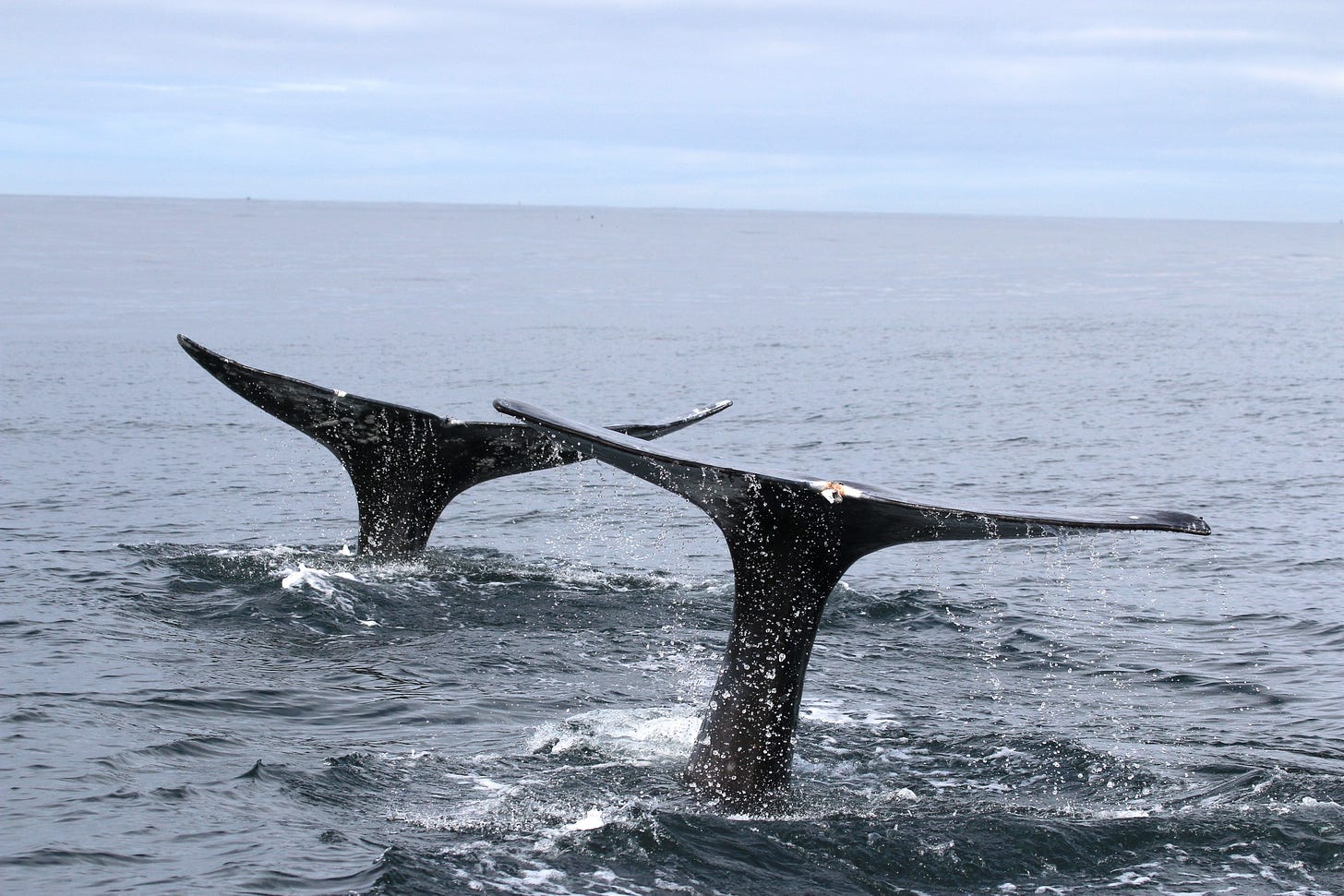Oregon is Facing Largest Energy Development Threat in Generations
The federal government is planning to build hundreds of Empire State Building sized wind turbines off our coast, with unknown risks to ocean life

I’m Max Wilbert, co-founder of Protect Thacker Pass and co-author of ‘Bright Green Lies: How the Environmental Movement Lost Its Way and What We Can Do About It.’ This is Biocentric, a newsletter focused on sustainability, greenwashing, and building a resistance movement to defend the planet.
The following piece was originally published in a shortened form by The Oregonian (the daily newspaper in Portland, Oregon) on Sunday, May 26th.
It is a little-known fact Oregon is now facing the largest energy development project in generations: more than 1,800 square miles of offshore wind turbines proposed for the deep waters off the central and southern Oregon coast.
That’s an area 8 times larger than Portland, Gresham, Hillsboro, and Beaverton combined, and more than 6 times the size of Crater Lake National Park.
The government agency responsible for offshore wind energy permitting, the Bureau of Ocean Energy Management (BOEM), claims these projects will have “no significant impact.” And yet, according to a 2022 paper in the scientific journal Ocean Sustainability, “offshore wind may lead to significant environmental impacts.” The science directly contradicts what we’re being told.
This is not a surprise when you consider what is involved: dozens or hundreds of steel towers, each as tall as the Empire State Building, each floating on a steel platform the size of a baseball stadium and anchored to the sea floor with hundreds of miles of steel cables and chains as thick as a human body.
Producing industrial products of this magnitude has incredibly serious environmental impacts. The steel, copper, plastics, balsa wood, and other materials required for producing these offshore wind turbines will require large amounts of mining and extraction that causes well-documented habitat destruction, pollution, and human rights violations around the world. The sheer scale of these projects means they are certain to have substantial impacts to the natural environment, including possibly harming salmon, whales and other marine mammals, and birds.

But perhaps the most terrifying possibility is that building these wind turbines to capture wind energy modifies ocean currents that drive the upwelling of nutrients. One early study on this topic found that “Wind-driven upwelling in the California Current is responsible for much of the primary productivity that sustains one of the richest ecosystems on the planet”, and that offshore wind turbines could shift this upwelling “outside the bounds of natural variability.” Their conclusion? “The consequences of these changes in physical upwelling structure on the ecosystem are currently unknown”.
In other words, we haven’t the faintest idea what harms this will cause.
Scientists will attempt to model the impacts of these projects, but there is no way to know for certain without building them and seeing what happens. As another paper concluded, “The novelty of the technology and the construction processes make it difficult to identify all of the stressors on marine species and to estimate the effects of these activities.”
This is one reason why the Yurok Tribe, Bear River Band of the Rohnerville Rancheria, Cher-Ae Heights Indian Community of the Trinidad Rancheria, Confederated Tribes of the Coos, Lower Umpqua, and Siuslaw, and the Tolowi Dee-ni’ Nation have passed resolutions opposing all offshore wind energy projects in Oregon and California, and why the National Congress of American Indians has called for a moratorium.

A total lack of knowledge has never stopped corporations and government from destroying the natural environment before. Oregon has experience with major energy projects purporting to be green that end up seriously harming our environment. The hydroelectric dams built along the Columbia River and in the Willamette watershed provide abundant cheap electricity, but at the cost of decimating the salmon, steelhead, and lamprey runs which defined this region for millions of years.
The first argument that any opponents of these turbines face is that we are global warming deniers being paid by the fossil fuel industry. Global warming is a crisis. I've seen first-hand the effects of climate change on permafrost and have worked for many years to oppose fossil fuel projects such as tar sands and pipelines, even taking non-violent direct action and risking arrest to defend our planet.
Working to halt global warming and end our dependence on fossil fuels is essential. Oregonians have made it clear that new fossil projects are not welcome in the state, and the State Government has even attempted (unsuccessfully) to scuttle pipeline expansions. We even halted the Jordan Cove LNG pipeline and export terminal. This is very important work. But one harm does not justify another.
The Earth’s oceans are vast but fragile. They are already heavily impacted by industry, global warming, overfishing, and ocean acidification. Offshore energy development is yet another assault on the integrity of these ecosystems.
Offshore energy plans for our region are just getting started. Now is the time to stand up alongside scientists, grassroots environmentalists, Native American tribes, fishermen, and everyday people to protect the Pacific Ocean.
To join the opposition, visit https://www.protectthecoastpnw.org.
On a different note, those who missed the live fundraising event for Thacker Pass water protecters on May 29th can view the video here.



Max, your concerns are completely justified, of course. A question to ask is if they will even happen. With FFs running out and materials like copper in short supply, this build out of "renewable" energy is unlikely to happen at the scale envisioned and is ultimately a dead end anyhow. The Honest Sorcerer explains this well. https://thehonestsorcerer.substack.com/p/the-energy-transition-story-has-become?publication_id=1498475&post_id=145191028&isFreemail=true&r=putep&triedRedirect=true
"One harm does not justify another." That about sums it up! Another great piece of writing, Max. Keep it up!
https://scaledown.substack.com/p/war-of-the-world-views